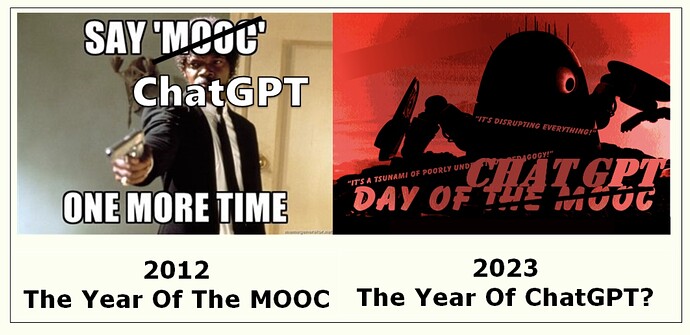Via Colin de la Higuera @cdlh who has both deep experience and interest in generative AI, a paper he authored in an effort to shift discussions beyond a focus on potential cheating, available in both French language it was authored and version translated into English.
L’intelligence artificielle au quotidien : quelle position pour l’enseignant.e? (en franças) / Artificial Intelligence in everyday life: What role for the teacher? (in English)
A key point is this interest in AI is hardly new:
Une première chose à dire est que l’intelligence artificielle ne s’est pas installée comme acteur du monde de l’éducation le 30 novembre 2022 avec l’arrivée publique de ChatGPT. D’une part, ChatGPT n’était qu’une itération d’une suite d’outils génératifs que nous testions depuis plusieurs mois ; d’autre part, des outils utilisant l’intelligence artificielle étaient déjà en train d’impacter l’éducation, cette fois dans un profond silence médiatique, depuis un moment. Nous sommes partenaires du projet européen AI4T dont l’objectif est de former les enseignant.es dans 5 pays européens, dont la France, à l’intelligence artificielle et surtout à sa compréhension et son usage raisonné.
A first thing to say is that artificial intelligence did not establish itself as an actor in the world of education on November 30, 2022 with the public introduction of ChatGPT. On the one hand, ChatGPT was just an iteration of a suite of generative tools that we had been testing for several months; on the other hand, tools using artificial intelligence had already been impacting education, in deep media silence, for quite a while. We are partners of the European AI4T project, the objective of which is to train teachers in 5 European countries in artificial intelligence and above all in its understanding and reasoned use.
I am already taking note of the AI4T site as an important resource.
Nous assistons en réalité à deux débats qui se superposent et se contredisent :
- Former l’élève au monde de demain passe nécessairement par la formation aux outils qu’il/elle aura à rencontrer. On peut penser aux outils numériques, et en premier lieu à Internet (à quand la possibilité et même l’obligation d’utiliser -comme au Danemark- Internet pendant ses examens ?). En 2023, savoir utiliser correctement un correcteur orthographique et grammatical paraîtrait plus important que d’être certain.e des conjugaisons de temps rares ou de l’obtention d’une bonne note à la dictée de Pivot. Et il s’agit donc à l’école de pouvoir s’adapter à des outils comme ChatGPT ou ceux qui vont suivre. Notons que des propositions commencent à se faire en ce sens (Canopé).
- La question de l’évaluation sommative préoccupe. Et le mot “triche” est alors sur toutes les lèvres. S’il faut d’abord bien réfléchir à ce qu’on entend par “tricher” (voir le paragraphe antérieur), il convient de faire le constat qu’une partie des méthodes d’évaluation des connaissances de 2022 sont aujourd’hui caduques. C’est le cas en particulier de toutes celles reposant sur une épreuve à distance ou sur un travail personnel. Pour certain.es, cette question est prioritaire et toutes les questions deviennent secondaires. Cela peut alors conduire à interdire, parler de plagiat, menacer d’exclusion les élèves fautifs.
Prises ensemble, ces deux questions s’annulent : “former à utiliser l’IA” devient “former des futurs tricheurs et tricheuses” et inversement, interdire l’usage de ces technologies conduit à ne pas former au monde de demain.
La solution ? Séparer les débats, se reposer la question des compétences à acquérir, puis repenser la question de l’évaluation : nombreuses sont les personnes à penser qu’il était temps de le faire de toute façon.
in English:
In reality, we are witnessing two debates that overlap and contradict each other:
- Training the student for tomorrow’s world necessarily involves training to the tools he/she will have to encounter. We can think of digital tools, and in the first place the Internet (when will it be possible and even compulsory to use the Internet – as in Denmark – during exams?). In 2023, knowing how to correctly use a spelling and grammar checker would seem more important than being certain of rare tense conjugations or of obtaining a good grade on an elaborate dictation. And it is therefore a question for the school being able to adapt to tools like ChatGPT or those that will follow. Note that proposals are beginning to be made in this direction (Andrew Heft’s guide for teachers, Canopé).
- The issue of summative assessment is a concern. And in that setting the word “cheating” is then on everyone’s lips. If we must first think carefully about what we mean by “cheating” (see the previous paragraph), it should be noted that part of the knowledge assessment methods of 2022 are now obsolete. This is particularly the case for all those based on distance tests or on personal work. For some, this question is a priority and all other questions become secondary. This can then lead to banning, talking about plagiarism, threatening the offending students with exclusion.
Taken together, these two questions cancel each other out: “training to use AI” becomes “training future cheaters” and conversely, prohibiting the use of these technologies leads to not training for the world of tomorrow.
The answer? We have to separate the debates, rethink the question of the skills to be acquired, then the question of the evaluation: many people think that it is time to do it anyway.
How do we avoid the canceling out affect of this questions? Again, where are the discussions in your part of this world? Do we have input from our Francophone community?
And Colin’s article was not specific about Open Education, so what is the interest, issues here for open educators?
Please read the papers and weigh in!
